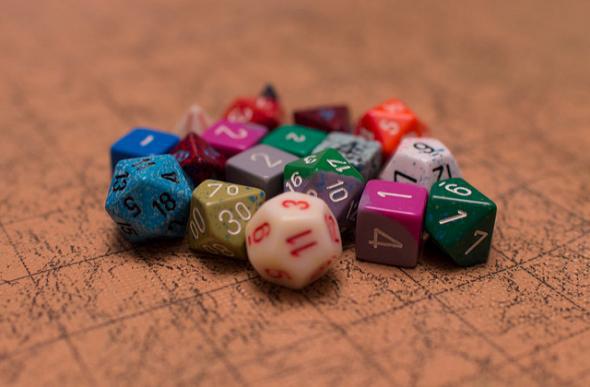This question originally appeared on Quora, the knowledge-sharing network where compelling questions are answered by people with unique insights. You can follow Quora on Twitter, Facebook, and Google Plus.
Answer by David Durham, dungeon master:
I have the luxury of running games with a group of very seasoned players. The game takes place every Monday evening in Atlanta, and has for more than 30 years, from 8 p.m. until midnight. Most of the participants have logged at least 10 years in the game. Five of us have been there from the beginning. Currently, there are around 12 who regularly attend, and there’s a sizable waiting list to get into it. I don’t know how unique this situation is. We may be setting records in the annuls of D&D gaming, for all I know. The campaigns are based on the game’s second edition, but we have adapted anything we like from subsequent editions and absorbed them into the mechanics of our games.
Running a game with players as experienced as the group I deal with is a challenge. They milk the rules for every advantage they can manage. Coming up with ways to challenge this bunch requires a lot of imagination. And thievery. I steal from movies, TV shows, books, short stories, and the historical record of humanity. It also requires what amounts to a law degree in D&D rules. As the DM, I act as a one-man Supreme Court. If players want a character to pull off a maneuver where the rules are somewhat ambiguous (and over 30 years this has happened a lot), I allow him to state his case, I weigh his assertions, and then I make a ruling. Applying logic to the use of things like magic can be tricky, but it can be done. You just need to be firm and as consistent as possible. This cuts down on some of the bickering.
As for bickering between players, I use a two-tiered system. There is off-the-clock bickering, where arguments erupt over what course the group should take when they’ve reached a point where they can realistically hash out what they should do. Maybe they’re in a suite of rooms at an inn or camped outside of a town where they will attempt some sort of derring-do the next day. Then there’s on-the-clock bickering, which takes place right in the middle of the action. Bickering on-the-clock costs crucial time, and I let the players know it. While you’re arguing over minutia, various entities are closing in and this means you either resolve your debate quickly or other factors will resolve it for you.
Off-the-clock bickering can actually be good for character development. A paladin might assert that no innocents can be injured in a proposed action. A thief may then chime in and say that that’s fine, but it will require the group to be sneaky. Paladins don’t generally like being sneaky, but if it will save innocent lives, they’ll acquiesce. Such debate is an opportunity to allow things like alignment, character backstories, and eccentricities to come to the forefront. The trick is to keep the debate centered on character, and again, I’m fortunate in that I’ve got a group where character is paramount. We don’t really care if your fighter is the biggest badass that ever came down the pike. Is the character interesting? Does he or she add a compelling dynamic to the overall story? A phobia regarding spiders is more interesting to us than a plus-five sword.
On-the-clock bickering can be good for character development too, but as a DM I’m going to use it to increase the tension in a given situation. Depend on that. And believe me, the players know it. As they argue, I’m subtly rolling the dice, which they hear, and the bad guys are moving in. If you make an argumentative statement in the middle of a melee, it costs you an action. You ran your mouth rather than swinging your weapon or pointing a wand. This cuts down on needless chitchat pretty effectively.
This brings us to what we in our game call “wrong reality.” Bickering in-character is one thing; getting personal regarding a player is another. When someone gets personal with a comment, be it how a particular player conducts herself in-game or whatever, such remarks are met with various players piping up with “Wrong reality!” Personal digs can cost you experience points in my game, and everybody knows it. People have been kicked out of the game for too “wrong reality” utterances. It’s rare, but it has happened. If you have a problem with how a player behaves on Monday nights, you discuss it with him outside of the game. I’ve done this a number of times, where appropriate, and it usually works out fine.
In the end it comes down to realism. Is the bickering realistic for the characters in the context of the story? If so, I let it happen. If it isn’t, if it’s wrong reality bullshit, and I make it costly.
How can I get my D&D players to cooperate instead of just bickering with each other? originally appeared on Quora. More questions on Quora:
